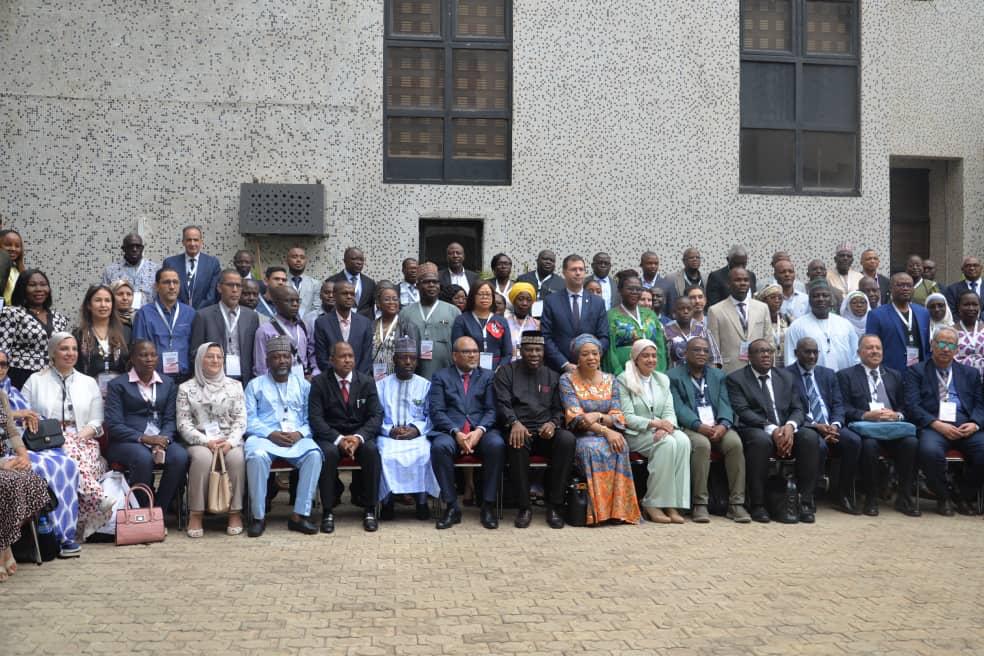RAF9070: NIGERIA HOSTS THE FIRST COORDINATING MEETING TAGGED “ENHANCING THE RADIATION SAFETY INFRASTRUCTURE (AFRA)”

RAF9070: NIGERIA HOSTS THE FIRST COORDINATING MEETING TAGGED “ENHANCING THE RADIATION SAFETY INFRASTRUCTURE (AFRA)”
The Federal Government of Nigeria, through the Nigerian Nuclear Regulatory Authority (NNRA) collaborated with the International Atomic Energy Agency (IAEA) is organizing the First Coordination Meeting of RAF9070 tagged “Enhancing the Radiation Safety Infrastructure (AFRA)" holding from 13th-17th May, 2024 in Abuja, Nigeria.
The event was set to provide African Member States with necessary assistance on their national radiation safety infrastructure and to ensure the safe, secure, and peaceful uses of nuclear energy and ionizing radiation, in line with international legal instruments and IAEA safety standards.
The Minister of State for Petroleum Resources (Oil) Senator Heineken Lokpobiri who was represented by Permanent Secretary, Ministry of Petroleum Resources, Ambassador Nicholas Agbo Ella, stated that radiation protection and safety in atomic and nuclear technology are key modules in achieving highest standards of protection and assurances of a safer global habitation and as such, the importance of the IAEA RAF9070 Project- with the theme “Enhancing the Radiation Safety Infrastructure (AFRA)” to Nigeria in particular and the continent as a whole cannot be overemphasized.
He added that given the complexity and diversity of activities and practices involving radioactive and nuclear materials as well as radiation generating devices, each Member State is ultimately responsible for the safety of facilities, activities and practices involving radiation sources on its own territory, thus there is a growing need to support and strengthen national regulatory bodies and to consider the broader policy implications that these challenges and emerging issues present.
He thanked the IAEA for its continuous support in ensuring safety and peaceful application of nuclear technology in the continent and reaffirmed Nigeria's unwavering commitment to advancing radiation safety and security for the benefit of present and future generations.
Addressing the guests and participants, the DG/CEO of NNRA Dr. Yau Idris submitted that this meeting was timely and important especially for our rapidly evolving world where the application of nuclear and radiation-based technologies in fields such as medicine, industry, mining and construction, scientific research, water resource management and agriculture even though offers immense benefits to society, can pose a threat if not managed efficiently and effectively. He said it is important as regulators to ensure the highest standards of radiation protection and safety to protect workers, patients, the public and the environment from the potential harmful effects of ionizing radiation.
He affirmed that Nigeria and Africa at large recognizes the critical importance of maintaining a robust and sustainable radiation safety infrastructure that encompasses regulatory frameworks, technical expertise, and institutional capacity and as such the goal is not only to mitigate the risks associated with radiation exposure but also to promote the safe and responsible use of nuclear and radiation technologies for the betterment of our society. Dr. Yau reiterated NNRA’s commitment to collaborate with stakeholders and other African Countries to ensure absolute safety.
Director, Division for Africa, IAEA Professor shaukat Abdulrazak commended the Nigerian Government for hosting the RAF9070 project which he said demonstrates strong commitment of the Government towards the safe and peaceful application of nuclear energy. He thanked the NNRA and by extension the Government for a good coordination and warm reception.
In attendance were; Honorable Minister for Health and Social Welfare, Dr.Tunji Alausa, Permanent Secretary, Federal Ministry of Petroleum Resources, Ambassador, Nicolas Agbo Ella, Permanent Secretary, Ministry of Power, Alhaji Mamudah Mamman and the Director, Division for Africa, IAEA, Prof. Shaukat Abdulrazak
The participating countries were; Algeria, Angola, Benin, Botswana, Burkina Faso, Burundi, Cameroon, Central African Republic, Chad, Comoros, Côte d'Ivoire, Djibouti, Egypt, Eritrea, Ethiopia, Gabon, Gambia, Ghana, Kenya, Lesotho, Liberia, Libya, Madagascar, Malawi, Mali, Mauritania, Mauritius, Morocco, Mozambique, Namibia, Niger, Rwanda, Senegal, Seychelles, Sierra Leone, South Africa, Sudan, Togo, Tunisia, Uganda, United Republic of Tanzania, Zambia, Zimbabwe and host country, Nigeria.
©2025 NNRA. All Rights Reserved
